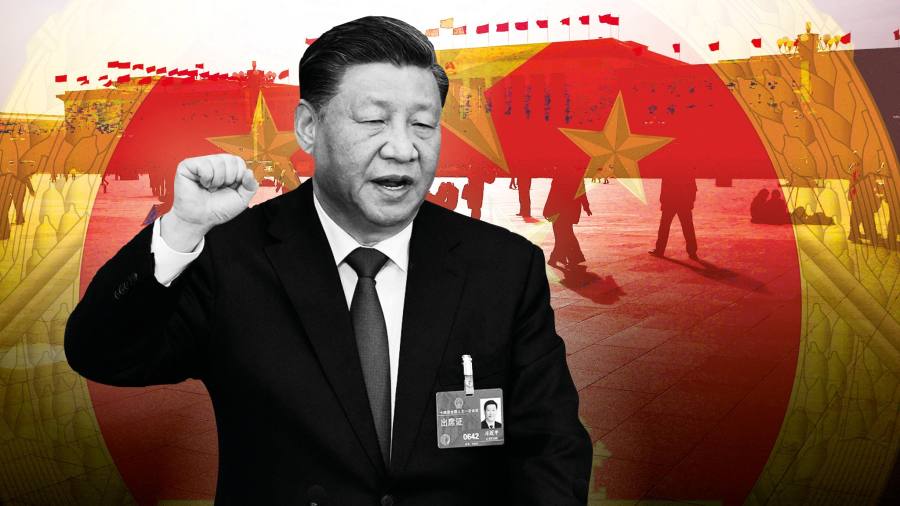
Receive free Chinese corruption updates
We’ll send you a myFT Daily Digest email rounding up the latest Chinese corruption news every morning.
For 10 years, China’s president Xi Jinping has deployed the communist party’s internal watchdogs to eradicate political treachery and corruption across almost every facet of Chinese officialdom. Now, these deeply feared investigators are being let loose on a new target: themselves.
At least 20 officials from China’s powerful anti-corruption units — the Central Commission for Discipline Inspection and National Supervisory Commission — have come under investigation this year, according to official announcements and academic analyses.
The tally of cases in the past six months is more than the annual total for any year since 2014, at the height of Xi’s anti-corruption crusade.
Alex Payette, chief executive of the Cercius Group, a consultancy that specialises in elite Chinese politics, said while many of the cases were “lower profile” and not focused on leadership, the scrutiny within the anti-corruption apparatus had become “very intense”.
“They’re moving to a different phase of the corruption crackdown . . . trying to keep the blade clean,” he said.
In January, just months into his third five-year term as head of the Chinese Communist party, Xi issued a new warning to top CCDI officials over their conduct. China, he told them, “will become strong only if the party maintains its strength”.
“Corrupt officials who show no sign of restraint should be punished. Corruption that involves both political and economic elements should be resolutely investigated and dealt with,” Xi said, according to state media reports.
Under Xi, China’s most powerful leader since Mao Zedong, anti-corruption crackdowns have served the dual purpose of eliminating graft endemic in the country’s administration and taking down political rivals.
However, while there was “no doubt there has been an uptick” in cases targeting the investigators themselves, there did not appear to be evidence of a particular political clique or faction being targeted, said Andrew Wedeman, an expert in Chinese corruption at Georgia State University.
Instead, the internal scrutiny was more likely reflecting the “chronic, never-ending” nature of China’s corruption problem, despite graft-busting being one of Xi’s hallmark policies, Wedeman said.
“You would think with all the sound and fury . . . everyone would be paralysed, terrified. Obviously, they weren’t paralysed,” he said.
The list of anti-graft officials who have come under investigation by the CCDI and NSC this year covers a broad swathe of China’s state apparatus, implicating members of public security bureaus, regional government departments, financial institutions, universities and provincial-level party committees. It spans the country’s geography, from the south-western megacity of Chongqing to Inner Mongolia.
They include Hao Zongqiang, the CCDI’s propaganda department deputy chief; Liu Weihong, the anti-graft agency’s party secretary for the Open University of Guangdong; Zhou Peibin, head of the CCDI team in Shanxi province’s public security bureau; Yin Xueru, deputy-secretary of the Ningxia province CCDI; and Wang Xuefeng, deputy-director of the Hebei People’s Congress.
Experts diverge over the root causes of corruption in China. Some argue graft is dominated by connections between the political and business elite, while others argue it is prevalent across society, with low-paid officials soliciting bribes.
Since 2012, the corruption crackdown has ensnared at least 4.7mn low-ranking officials, or “flies”, as well as thousands of higher-ranking “tigers”, state media reported. The CCP has nearly 100mn members.
The targeting of CCDI officials shows the campaign could now be moving into an “advanced stage”, said Lynette Ong at the University of Toronto.
“It’s too early to speculate if this portends the end of the campaign, but it certainly appears to be a milestone,” she said.
Ong pointed out that over the past decade, the CCDI’s focus had moved from local officials to provincial and central government officials, and to sectors “from the periphery to the core”.
In recent years, its focus has widened to include officials and executives in industries Xi views as particularly important to national security and economic stability, including finance, energy, technology and defence.
Yuen Yuen Ang, a China expert at Johns Hopkins University, said Xi’s “solution” to China’s historic cycles of rise and decline appeared to be “perpetual anti-corruption”.
“Perhaps the biggest challenge is ‘who will guard the guardians?’ The inward turn of the campaign reflects this,” she added.